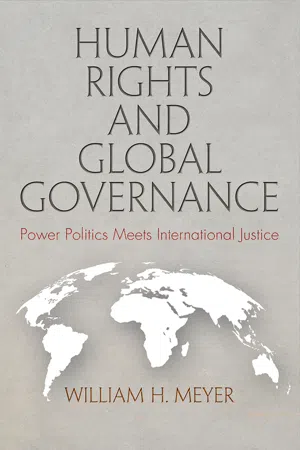
Human Rights and Global Governance
Power Politics Meets International Justice
- 280 pages
- English
- PDF
- Available on iOS & Android
About This Book
International human rights have been an important matter for study, policy, and activism since the end of World War II. However, as William H. Meyer observes, global governance is not only a relatively new topic for students of interational relations but also a widely used yet often contested concept. Despite the conflicting and often politicized uses of the term, three key dimensions of global governance can be identified: the impact of diplomatic international organizations such as the International Criminal Court, the importance of nonstate actors and global civil society, and global political trends that can be gleaned from empirical observation and data collection. In Human Rights and Global Governance, Meyer defines global governance generally as the management of global issues within a political space that has no single centralized authority.Employing a combination of historical, quantitative, normative, and policy analyses, Meyer presents a series of case studies at the intersection of power politics and international justice. He examines the global campaign to end impunity for dictators; the recognition, violation, and protection of indigenous rights; the creation and expansion of efforts to ensure corporate social responsibility; the interactions between labor rights and development in the Global South; just war theory as it applies to torturing terrorists, war crimes in Afghanistan and Iraq, and the drone wars; and the global strategic environment that best facilitates the making of human rights treaties. Meyer concludes with an evaluation of the successes and failures of two exemplary models for the global governance of human rights as well as recommendations for public policy changes and visions for the future.
Frequently asked questions
Information
Table of contents
- Cover
- Human Rights and Global Governance
- Title
- Copyright
- Contents
- List of Abbreviations
- Introduction
- Chapter 1. The Pinochet Precedent as an Exemplar of Global Governance
- Chapter 2. Indigenous Rights and Global Governance
- Chapter 3. Corporate Social Responsibility and Global Governance
- Chapter 4. Testing Theories of Labor Rights and Development
- Chapter 5. Torture, Terror, and Unjust Wars
- Chapter 6. Human Rights Treaties and the Pacific Interregnum
- Chapter 7. Two Models and Future Prospects for Global Governance of Human Rights
- Notes
- References
- Index
- Acknowledgments